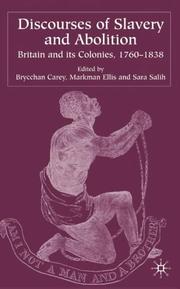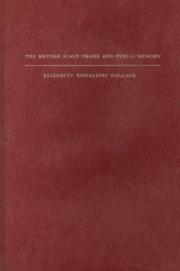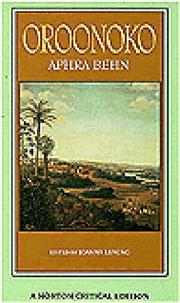| Listing 1 - 10 of 24 | << page >> |
Sort by
|
Book
Abstract | Keywords | Export | Availability | Bookmark
 Loading...
Loading...Choose an application
- Reference Manager
- EndNote
- RefWorks (Direct export to RefWorks)
Traite des esclaves -- Journaux intimes -- Récits personnels
Slave trade --- Slave trade in literature --- Diaries --- Personal narratives [French ]
Book
ISBN: 0821444123 9780821444122 9780821419953 0821419951 Year: 2012 Publisher: Athens, Ohio Ohio University Press
Abstract | Keywords | Export | Availability | Bookmark
 Loading...
Loading...Choose an application
- Reference Manager
- EndNote
- RefWorks (Direct export to RefWorks)
Metaphor and the Slave Trade provides compelling evidence of the hidden but unmistakable traces of the transatlantic slave trade that persist in West African discourse. Through an examination of metaphors that describe the trauma, loss, and suffering associated with the commerce in human lives, this book shows how the horrors of slavery are communicated from generation to generation. Laura T. Murphy's insightful new readings of canonical West African fiction, autobiography, drama, and poetry explore the relationship between memory and metaphor and emphasize how repressed or otherwise margina

ISBN: 1403916470 Year: 2004 Publisher: Basingstoke : Palgrave Macmillan,
Abstract | Keywords | Export | Availability | Bookmark
 Loading...
Loading...Choose an application
- Reference Manager
- EndNote
- RefWorks (Direct export to RefWorks)
Slave trade --- Slavery --- Slave trade in literature. --- Slavery in literature. --- History --- Colonies --- History.
Book
ISBN: 9782745357113 2745357115 Year: 2022 Publisher: Paris Honoré Champion
Abstract | Keywords | Export | Availability | Bookmark
 Loading...
Loading...Choose an application
- Reference Manager
- EndNote
- RefWorks (Direct export to RefWorks)
Etudes sur l'ancrage géographique de la mémoire de l'esclavage et de la traite des Noirs. L'océan est considéré comme le lieu de la fracture entre les deux rives. Les contributeurs interrogent l'inscription de faits humains, sociaux et historiques dans l'espace maritime, la géographie littéraire des lieux de mémoire et l'approche mémorielle depuis les années 1990.
Slave trade in literature. --- Slave trade --- African Americans --- French literature --- Memory --- History. --- Migrations. --- History and criticism --- Social aspects.
Book
ISBN: 9782753586840 2753586845 Year: 2022 Publisher: 35-Rennes: Rennes: Impr. Service reprographique de l'Université Rennes 2, Presses universitaires de Rennes,
Abstract | Keywords | Export | Availability | Bookmark
 Loading...
Loading...Choose an application
- Reference Manager
- EndNote
- RefWorks (Direct export to RefWorks)
Cet ouvrage aborde les discours et les images qui représentent la traite esclavagiste, du XVIe au XXIe siècle, et sur les trois continents concernés : l'Afrique, l'Europe, l'Amérique ; il analyse notamment la façon dont écrivains et artistes se sont emparés des mémoires, des imaginaires et des traumatismes de l'esclavage pour réécrire l'Histoire. Des peintures de Jacob Lawrence aux romans d'Ayi Kwei Armah, des films sur le passage du milieu aux bandes dessinées, des romans historiques de Kangni Alem au témoignage de Lewis Cudjo, les œuvres étudiées soulignent les traces de l'esclavage sur le présent. À l'instar des artistes et des écrivains, les musées qui revisitent ce passé à travers de nouvelles mises en scène expriment le besoin de décoloniser les mémoires de l'esclavage en reconstruisant la subjectivité de l'esclavisé. Cet ouvrage participe à cet effort collectif en portant l'attention du lecteur sur les nouveaux récits de l'esclavage
Slave trade in art --- Slavery in literature --- Slave trade in literature --- Slavery in motion pictures --- Slavery in art --- Collective memory
Book
ISBN: 9789004377585 Year: 2019 Publisher: Leiden ; Boston : Brill Rodopi,
Abstract | Keywords | Export | Availability | Bookmark
 Loading...
Loading...Choose an application
- Reference Manager
- EndNote
- RefWorks (Direct export to RefWorks)
In Narrating the Slave Trade, Theorizing Community, Raphaël Lambert explores the notion of community in conjunction with literary works concerned with the transatlantic slave trade. The recent surge of interest in both slave trade and community studies concurs with the return of free-market ideology, which once justified and facilitated the exponential growth of the slave trade. The motif of unbridled capitalism recurs in all the works discussed herein; however, community, whether racial, political, utopian, or conceptual, emerges as a fitting frame of reference to reveal unsuspected facets of the relationships between all involved parties, and expose the ramifications of the trade across time and space. Ultimately, this book calls for a complete reevaluation of what it means to live together.
Slave trade in literature. --- Slavery in literature. --- Literature, Modern --- Literature, Modern --- History and criticism. --- History and criticism.
Book
ISBN: 9783603752 9789783603752 9783708546 9789783708549 9789783708549 1322329850 Year: 2014 Publisher: Oxford, [England] : African Library of Critical Writing,
Abstract | Keywords | Export | Availability | Bookmark
 Loading...
Loading...Choose an application
- Reference Manager
- EndNote
- RefWorks (Direct export to RefWorks)
Gender Issues in African Literature examines the ways in which some protagonists of African fictions are made to counter and challenge intertwined Western discourses on gender, employment, sexuality, and health. Here the conflict between Tradition and Modernity is argues from the favourite premise of male supremacist ideology showing how women have ëunlearnedí these false concepts to build a sustained feminist movement and (re)learn the value of sisterhood. There is a bold attempt to reread Achebe as a consistent in urging women to fight the seemingly oppressive structures that have traditiona
Book
ISBN: 9780814254714 9780814213650 Year: 2018 Publisher: Columbus : The Ohio State University Press,
Abstract | Keywords | Export | Availability | Bookmark
 Loading...
Loading...Choose an application
- Reference Manager
- EndNote
- RefWorks (Direct export to RefWorks)
In Reimagining the Middle Passage: Black Resistance in Literature, Television, and Song, Tara T. Green turns to twentieth- and recent twenty-first-century representations of the Middle Passage created by African-descended artists and writers. Examining how these writers and performers revised and reimagined the Middle Passage in their work, Green argues that they recognized it as a historical and geographical site of trauma as well as a symbol for a place of understanding and change. Their work represents the legacy African captives left for resisting "social death" (the idea that Black life does not matter), but it also highlights strong resistance to that social death (the idea that it does matter).
American literature --- Slavery in literature. --- Slave trade in literature. --- Slavery in mass media. --- African Americans --- African American arts. --- African American authors --- History and criticism. --- Intellectual life.

ISBN: 023113715X 0231137141 0231510314 9780231510318 9780231137140 9780231137157 Year: 2006 Publisher: New York, NY
Abstract | Keywords | Export | Availability | Bookmark
 Loading...
Loading...Choose an application
- Reference Manager
- EndNote
- RefWorks (Direct export to RefWorks)
How does a contemporary society restore to its public memory a momentous event like its own participation in transatlantic slavery? What are the stakes of once more restoring the slave trade to public memory? What can be learned from this history? Elizabeth Kowaleski Wallace explores these questions in her study of depictions and remembrances of British involvement in the slave trade. Skillfully incorporating a range of material, Wallace discusses and analyzes how museum exhibits, novels, television shows, movies, and a play created and produced in Britain from 1990 to 2000 grappled with the subject of slavery. Topics discussed include a walking tour in the former slave-trading port of Bristol; novels by Caryl Phillips and Barry Unsworth; a television adaptation of Jane Austen's Mansfield Park; and a revival of Aphra Behn's Oroonoko for the Royal Shakespeare Company. In each case, Wallace reveals how these works and performances illuminate and obscure the history of the slave trade and its legacy. While Wallace focuses on Britain, her work also speaks to questions of how the United States and other nations remember inglorious chapters from their past.
Slave trade --- Public opinion --- Slave trade in literature --- Slavery in literature --- Sociology & Social History --- Social Sciences --- Communities - Social Classes --- History --- Slave trade in literature. --- Slavery in literature. --- Public opinion. --- Slavery and slaves in literature --- Slaves in literature --- Enslaved persons in literature --- TRAITE DES ESCLAVES --- OPINION PUBLIQUE --- ESCLAVAGE ET ESCLAVES DANS LA LITTERATURE --- GRANDE BRETAGNE --- HISTOIRE --- DANS LA LITTERATURE

ISBN: 0393970140 Year: 1997 Publisher: New York (N.Y.) : Norton,
Abstract | Keywords | Export | Availability | Bookmark
 Loading...
Loading...Choose an application
- Reference Manager
- EndNote
- RefWorks (Direct export to RefWorks)
Princes --- -Slave trade --- -Slave trade in literature --- Slavery in literature --- Slaves --- -#KVHA:American Studies --- Enslaved persons --- Persons --- Slavery --- Slavery and slaves in literature --- Slaves in literature --- Royalty --- Courts and courtiers --- Fiction --- History --- -Sources --- Behn, Aphra --- Africa --- Caribbean Area --- -Suriname --- Caribbean Free Trade Association countries --- Caribbean Region --- Caribbean Sea Region --- West Indies Region --- Fiction. --- Slave trade in literature. --- Slave trade --- Slavery in literature. --- Sources. --- Slave trade in literature --- #KVHA:American Studies --- History&delete& --- Sources --- Behn, Aphra, --- Suriname --- Surinam --- Republiek Suriname --- Republic of Suriname --- Sūrīnāma --- Surinaam --- Dutch Guiana --- Guiana, Dutch --- Netherlands Guiana --- Guiana, Netherlands --- Netherland Guiana --- Nederlandisch Guyana --- Nederlandsch Guyana --- スリナム --- Surinamu --- オランダ領ギアナ --- Orandaryō Giana --- 蘭領ギアナ --- Ranryō Giana --- Enslaved persons in literature
| Listing 1 - 10 of 24 | << page >> |
Sort by
|

 Search
Search Feedback
Feedback About UniCat
About UniCat  Help
Help News
News